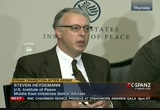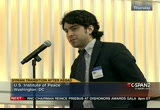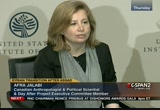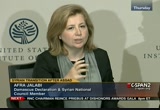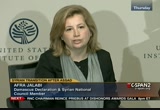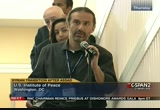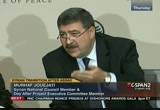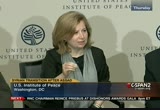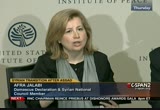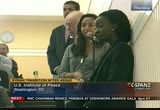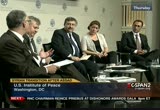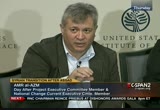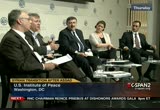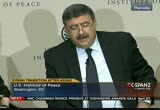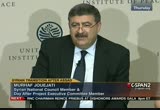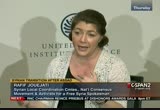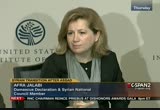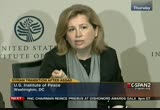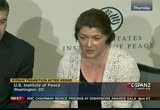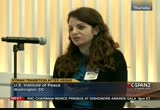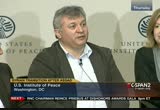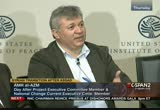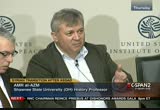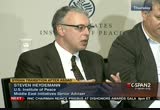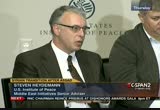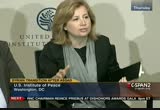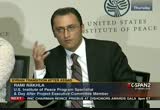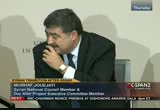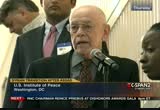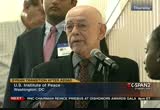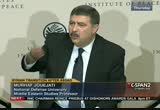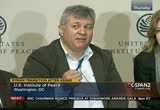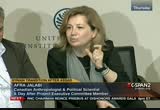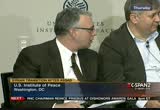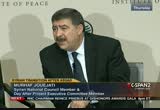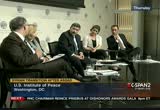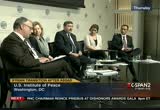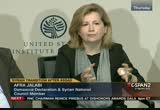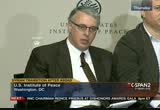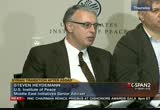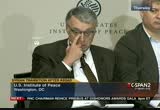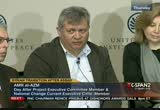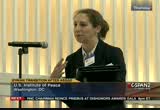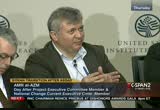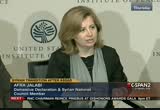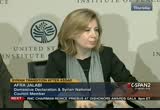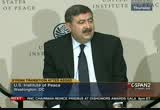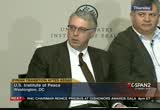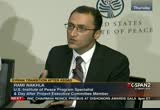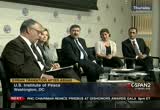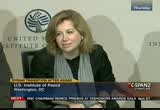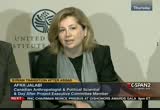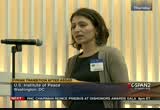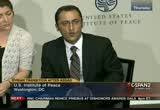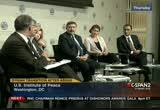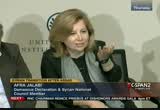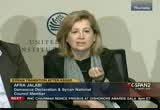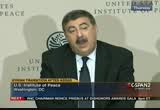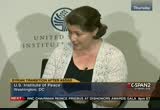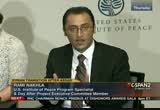tv Close Up CSPAN October 5, 2012 7:00pm-8:00pm EDT
7:00 pm
7:01 pm
impossible peace negotiations with the government. >> we tried to actually deal with this because behind the pressing issue of the recent violation and that is extremely a significant word in the syrian psyche at the moment, to see how recent and how large and as my colleague and friend here, rafif, was discussing the extent of the discussion. it is an overwhelming reality at the moment. you have those as you mentioned impacted very much throughout the last decade. but the way we try to do with this and the document is a recommended to committees that we passed an historic committee dealing with violations of human rights prior to the revolution and a communication with the recent plantations. of course through a grant to the challenge of documentation, but
7:02 pm
this is a process that's your intent to go through because really you have not counted or really given since i sent that accountability for all the torture they went through. recently in a workshop in istanbul that rami and iraq, which really gave us a sense of how the syrians are really responding in positive ways to the document, there were many activists thinking about these issues and did not always have the answer and they were expecting to find some of the recommendations were making. they had some reservations about even the work is toric. they said they like very much the concept and idea behind it, but they did not want to see the word history because that would give syrians a sense that these were dated violation, that they were somewhat historical issues, that they wanted a word, he
7:03 pm
turned that we will look into, they wanted a turn that actually expressed relevance and even they would be treated as fresh violations because they were never dealt with. we are hoping to create a framework in which all violations will be heard and would be a process of documenting and verification for evidence. they were not great and how mock and the national prison, where many were buried without being identified. so that has to be handled. if you look at the document can define specific recommendations. thank you for the question. regarding the negotiation issue and the syrian people at the moment are not really thinking about negotiating with the regime because the regime itself has put itself in a very stiff position and it displays the syrian people and a place where
7:04 pm
they either acquiesce back to almost displayed like situation or that they will be destroyed and shelled and bombed. so internationally, the regime has been doing actually a doublespeak and playing games. access to the international community, yes, we will withdraw heavy machinery and we will negotiate with the opposition, but on the ground it is completely the opposite. even the day they suspended and bombed the city, so syrians have been seen in this kind of an interesting technique to see how a dictatorship is trying to seem as applying and subscribing to the norms of the international committee, while its people are severely brutal or violent to it. >> thank you. therapy is >> is, good morning. came back for's tie. i am sean carlo gonzalez with talk service.
7:05 pm
i want to comment and say this is a blueprint -- on a blueprint, but a work in progress and i appreciate that. i know your type about a range of internal issues. what concerns have you addressed regarding serious role in the region regarding israel's concern that potentially this could be a safe haven for a? or iran's contention that this is a domestic issue. obviously, syria has a lot to do in this region and i just thought maybe i'd get your thoughts perhaps on what came out in your discussions. >> well, these issues that we have dealt with are mostly technical. you're talking about specific policy issues. and this of course will leave it up to any transitional government to devise his foreign policy, hopefully in
7:06 pm
consultation with the transitional democratic parliament. so this is really not our area. this is not our task, but a future democratic government. >> i am a student at georgetown university and my question is, have you considered the idea, sort of the idea that accountabilities could cause members of the regime are individuals or groups assist it with the regime to prolong power or to hold onto power for a longer period of time? and have you considered the idea of pardons and weigh that against the benefits of ending the conflict may be earlier. >> this has been quite sensitive because some syrians feel that they want to actually bring these people who have to be
7:07 pm
responsible for bloodshed and corruption to be really tiny on 10 trying. on the other hand coming out the the pragmatic, political needs the syrians have to face. so we recommend -- we shared to create someone a kind of combination of both conditional amnesty and also laceration embedding in a completely baathification as my colleague said. and to also create mechanisms where they would be local arbitration and mediation because that has been done in syria for, i mean, if not thousands come at least hundreds of years. they deal with this and perhaps more positive ways than we imagine, only when we think about legal solutions. and in reality, what has been happening when we see the deception from the syrians are generally welcoming and i think there's almost an unspoken kind
7:08 pm
of discourse that's happening, where people are really encouraged and that generally already brings them to the side of human rights, to the side of the people into the site of the revolution. of course the situation is somewhat sensitive to directly offer amnesty, given the incredible level of violation, but they're many of us who feel we need to do this in order to help undermine the regime and really break through its ranks. thank you. >> my name is angie and i am a student here in the u.s. in the middle of the revolution i started becoming afraid of what's going to happen is area, especially when the regime started using, but when i come and listen to initiatives, like the ones you are doing, and the future looks more optimistic than what i thought it would be. my question is, when do you
7:09 pm
think the regime is going to fault? [laughter] >> i am looking for my crystal ball. perhaps we should begin a betting pool among the audience. but no, let's take that question a little bit more seriously. we are all familiar with the broad trends of the revolution. i think we have seen that during the period from may to perhaps august, september, the revolution had gained him the capacity of the regime of command and control eroded. there seemed to be an accelerating rate of deflation among senior officers. we now find ourselves in early october and looks as if the incremental gain that the opposition enjoyed during the summer months have slowed and that there is the potential even for the reversal of some of those games. what does that tell us about the
7:10 pm
time horizon? we have talked about the transition beginning now. but does the general state of play tell us about the potential time? >> i think the trajectory that you can expect, and that is just my interpretation of it, this is how i see the church in jury. i think you will see, because of the way -- because of the resources available to the regime, particularly in terms of its constraints on its reliable manpower, what you will gradually see is a retreat from the east to the west and from the north to the south. the two critical core areas that the regime needs to be able to exert, to hold in order to maintain itself as a functioning regime are basically halt because god is the gateway to
7:11 pm
the core areas, the coastal mountains. also provides a core corridor that takes you into lebanon as well. it's an important supply route for the regime. and damascus is the capital, the century of government. as long as they hold damascus, the regime can continue to be in charge of syria, the government. once they lose damascus, well, they will for sure. when they lose damascus, that is when the regime as a government, the ability to say i now ruled syria, but that does not necessarily mean the end of the regime as an entity that is capable to continue to exert influence on the ground. so that's what i'm trying to say. there were two stages. there is going to be the fault of the actual government aspect
7:12 pm
of the regime and then there's going to be the eventual dismantling of the regime itself, which will take much longer. depending on what happens in the next few months, i would say maybe by next summer, don't quote me on this. >> i don't want to give a date, but compare and contrast, we are now in an 18th month of the revolution. go back to a year ago for demonstrators were all alone. look at the situation today, the peaceful demonstrations continue, but they are dependent by tens and thousands of three soldiers who defected. >> and joined by civilians, too. >> we need to acknowledge that.
7:13 pm
>> there's over 30 generals that have to set it appeared a year ago we were constantly speculating whether damascus and aleppo would be touched by this. well, over 50% of aleppo today has been liberated, major territories in the north of syria have been liberated. more with turkey and with iraq has liberated. the regime is bombing the outskirts of damascus every day. the regime now in its desperation is resorting to shoot a red lines. the regime has lost the echelon that has been decapitated not too long ago, so much so the regime is in so much trouble that yesterday, before yesterday and the whole town of bishara
7:14 pm
al-assad, there have been demonstrations, should and we understand, one of the cousins has been killed here this is to say nothing. so the family is in very serious trouble. compare this with a year ago and i think that would give us a glimpse into how long the and of the two is going to be. >> i wanted to reinforce the concept of the demonstrations two weeks ago. we recorded more than 540 peaceful demonstrations around the country, that these people continue to go out is a testament to their desire to expedite the fall of the regime. but you also see is one pillar support of the regime has been
7:15 pm
shaking and they've been shaking faster and faster and will collapse. you will see that in areas like media where we have a significant number of media personalities who are now speaking out. you see that in the business sector. i don't off everybody knows this, but there is a price tag on the heads. a bounty of $25 million for bashar al-assad's head. so all these pillars are shaking faster and faster. i don't think it's going to go to next summer. >> the point you raise about the sectarian issue. i think this is one of the regime was lying on and that is why they created fake syrian-based massacres in certain areas, especially in the western side of the area, which is really vulnerable area given
7:16 pm
its sectarian mixture, were you actually have one village alwaite, one village sunni, one village shiites. the testimony to serious cohesion and harmonious existence of her hundreds of dozens of years. this year and regime is really trying to break these organic coexist and structures that really marked the region. the amazing thing is the level of self restraint this year and people. there have not been retaliations, even ones that were not strongly protected. the syrian army has action to villages from other sacks and these do not engage in tearing violence. it has been fairly limited. i don't want to create an idealistic image. the sectarian sentiments have shown tremendous immunity.
7:17 pm
anybody would be touched to see the slogans that people raise only a day after the campaign were close to 900 people and many slaughtered to the army to subdue the city and the slogans they carried were this revolution and this is not a revolution every badge. if we do that, we have become you. only a day after such awful massacres shows you the spirit of the syrian people. so of course, the regime has been relying heavily on night and it has not worked the way it wanted. >> one more word or you may need get chairs. >> just a follow-up on this, right after the events are publicized, he saw a good new 10
7:18 pm
to 15 on facebook. alwaite against sectarian and for people to immediately react like that shows yet another traditional pillar of support is basically coming on. >> my name is dean mr. rookie. i miss them so now my actually been damascus last september to june. the question comes more from my experience and work. i kind of wanted to draw on an earlier quote from an early comment. the question every highs, who is going to be the leader? the greatest problem that seemed in syria is lack of unity. so i have to question, both from this issue of lack of unity. one is when i was in damascus commander stan damascus is an isolated bubble, one of the things i would see his rallies of up to 100,000 people who are rallying. and they were still people, so
7:19 pm
communities who very strongly support a shower and are willing to continue despite even after he falls, which is inevitable, then islam is going to be a bit tougher, but we'll see what happens. but first question is, how has this report taken into consideration those concerns, concerns of the people who are not necessarily pro-the opposition yet. my second question is the lack of unity within the opposition itself. and so my second question is when i first had this document made to try to organize those efforts. so that there can be a leader of the deal who can be charismatic, maybe something like egypt but revolution if you want to call a revolution forward. thank you very much. >> okay, i started off by saying
7:20 pm
really one of the culture change to what is the alternative, not who is the alternative. i mean, it's a natural reaction of people of syrians who have lived for four decades under a single totalitarian or authoritarian dictatorship. to think in those terms it was one of the challenges we had to take a to try and get people to move away from the personality cult to something much more civilized. in answer to the question, please remember we not damascus and lived to mask and many come in many years do we know how these rallies are put together. i was an employee at the state in the way you go a rally is in the morning you don't know. the local good squad show up in a basically stand their check your name as you file out.
7:21 pm
i received instructions saying make sure you take a roll call of everybody because everybody has to come back to work. everyone who does not come back i have to report them so they could relate to punish. this is in the good days. this is due for the uprising for anybody else. this is just to go out and cheer for a rally against governors. so we know how these things are put together. it's not to say there isn't also a significant number as i was certainly in the beginning, a number of people who were wavering or who didn't know -- or who couldn't get through and also remember were also concerned about the future. but as the regime has become more and more aggressive and the battle has come closer and closer to home. i had relatives of mine who came to visit us from damascus this summer and stayed with us for most of the summer.
7:22 pm
there is a change in the mindset of people, where even if they don't have an alternative, they just want to see him go. i'm tacking about immediate family friend. i think it's gone we are not. i don't think right now there are many people who really -- obviously those of us did in the regime have a lot of interest. so i think the assertive answers that side of it. >> there was this part of that question the problem of how you reassure communities who are afraid of the future. and what does the report say about that? i think the response of the syrian participants in our group took to this issue because it was understood as critical that the document did have the potential to play a role in providing an alternative conception of the future that might diminish some of the fears and uncertainty about what lay
7:23 pm
ahead. and the way that was addressed to us by presenting very clear principles that should guide the emergence of a new syria in the post assad area. poor alyssum, tolerance, ejection of events, rejection of exclusion, rejection of collective punishment and collective blame for the acts of individuals, a whole set of principles and guidelines and values that should communicate to constituencies, which remain uncertain that there are credible, legitimate groups within the syrian opposition who are determined to rebuild syria along lines that will provide space for all of its components to participate. not those who perpetrated crimes will be examined for accountability or justice. not the victims give an opportunity for justice, but
7:24 pm
that there'll be values, principles, strategies that guide the construction of a new syria that offer all components of syrian society hope for some team better than they have now. and it was precisely because this fear of change was seen as such an important barrier that those issues were so central in the document. >> addressing the fears basically, that's what the documents will be. >> and rami coming up to speed up to this because our recent encounter with activists who came out of syria or workshop and a symbol, we have some activists who directly came from syria and some of them recently about. one of the reasons they positively responded to the document and they shared this with us is they said that the documents power bias in its ability to create a national discourse rather than a revolutionary discourse because
7:25 pm
syrians have become weary of this ideological discourse that suffocated -- a discourse that is inclusive of our national interest and creating a culture of citizenship rather than ideological loyalty. the syrians are determined to create an atmosphere, ambience and discourse that would be inclusive to all syrians and not just those who are pro-revolution or producer pro that. we are very much tired of that mentality. rami. >> actually cannot go back to the question of who is the alternative. it is not an answer. we have to go through a process to bring a legitimate alternative. we know the answer right now, we don't know unless we go and vote for the alternative and then we will know. i would be so uncomfortable if i write now here know who will become the alternative.
7:26 pm
but me assure you for one thing, for four decades we did not even imagined like syria, at least to accept new leadership. right now it will be for syrian people. >> very quickly on this. >> very briefly is worth repeating that this document of all syrians regardless of ethnic origin and sectarian affiliation. you are right, there are fissures in the opposition, there is far more common ground than you might think. this includes all of them, but that is a civil and democratic state in syria. they are overplaying the divisions of the opposition and you are overplaying to support to the regime.
7:27 pm
i want to repeat what amr said. correct me if i'm wrong, they have their salaries cut if they don't show to these demonstrations. you have made seeing the cool kids are happily awake and go down and buses in order demonstrate. so the support of the regime is far, far less than you might think. >> let's move on. if there are questions from the web,. >> i am joe guggenheim, just an interested to sin. i want to be on the view you're saying. what can we do now in the future to stop the killing and the refugees and the horrible situation. the questions, can their there cease-fire be achieved knowing
7:28 pm
the brutality of the assad regime. want to focus on what happens when the kofi annan churchy broker since element. i urge you speak a week ago in washington about this whole career, but this question and basically said they were trying to work out a ceasefire and there would be a transition. and over the transition period, assad would sit down at some point, maybe not right away, but at a process. they would have supported the other elements that were more a regime whose supporters would've gone along along with this. but he said that the western assisted they had to sit down first instead of having a process where would be understood that he would step
7:29 pm
down. if he could come to an agreement, just think of the international place that should have the will security council to get the assad regime with a critical issue. there's whether you saw that process and a comment on it. >> they have a six-point plan. the assad regime accepted to withdraw heavy military equipment from cities. that acceptance wasn't more in the media than underground. the assad regime agreed to stop shooting at unarmed civilians and asked her to very commit further on cnn, but on the ground were snipers that took out unarmed civilians. and the six-point plan culminated in a political dialogue. it never mentioned that assad
7:30 pm
with later consider stepping down. the problem to breaching the six-point political dialogue is all beside previous points have been violated. and therefore, the assad regime tells you they'll accept a cease-fire immediately and unconditionally. i can tell you with confidence that the assad regime as point arrestees. >> i think my answer to that and according to you is a critical threat. we cannot wish bashar al-assad to stop. we need to commit to what i think is really wanted. we hope you will follow that. we need to be credible. >> can i just correct i would like to tell you, now, it is the syrian people.
7:31 pm
the west is nearly accolade while the bond and it took them a long time to get to that point. it took the heads of state and administration from the syrian people that eventually that was picked up as well. >> welcome i just say they insisted that it happened right away. >> we won't. at first he goes then we talk on the. >> one of the major weaknesses of sunday's planned, although syrians agreed to the importance of the six-point plan and even the free syria and carmine, if you remember, they agreed to the cease-fire, but they did not comply at all. in fact, they were sending more in two areas and released prisoners, like in one case be released at 100 prisoners or something of a arrested during that week more than 2000 people.
7:32 pm
but the real weakness of the kofi annan plan is the weakness in which he tried the conflict. he built the civil, civil war conflict, when in fact the whole issue is that we have an entire society rebelling against this brutal dictatorship and it has remained peaceful for the first five months. and because the brutality ended up getting armed in self-defense. many syrians feel that he failed to name the language he used to describe the conflict is actually a popular revolution based on civil rights, basic human rights. the
7:33 pm
when you have snipers taking out children this is not a regime with which you can negotiate. this is a regime that has to go. >> i would simply direct you to an interview that defected the syrian prime minister had. it was two days ago in which he said this was for the first time made public that he has gone with the most senior leaders. the regional command to ask for a ceasefire for there to be a political dialogue. assad said no way -- nor with
7:34 pm
anybody. it is the security solution of the security solution. [inaudible] >> yes with have a number of questions from viewers onlike and following on twitter. one is directed at you very straightforward. what was the hashtag you mentioned? and can you spell it? sourialalna. thank you. >> okay. two i additional questions. one, the fall of assad would provide a bubble of opportunity. what force can or will be used to secure stability in the post assad period? and i imagine that the implication it that some external force might be needed. our syrians prepared to accept
7:35 pm
it? >> are syrians prepared? glsh an material peace keeping. >> syrian public opinion is like any public opinion in the world. it's divided. you have many people who want an intervention immediately in order to stop the uprising and so you people calling for no-fly zones and you have people calling for safe haven and you have nobody wanting intervention. it is advise on this question but i think they are all united that the -- it needs to stop immediately. we have now an average of over 150 people civilians killed every day. and it is absolutely outrageous over the international community that 19 months on is continuous debate what it do and whatnot to codo. >> thank you. and our final question from twitter. i'll direct -- the day after
7:36 pm
project has a strong focus on accountability. would the projects supporters also support referrals to the international criminal court that might also implicate the free syrian army. >> in fact in the document we recommend that that subscribing to human rights is not exclusive to one side. that if there had been vailses by either side, that we need to be accountable. and many syrians, i talked to, agree with this. and in fact, in the recent last week public outcries and pressure on the free syrian army to subscribe to human rights. that came out and made decoration that they subscribed to question treatment of prisoners some apologied for the execution of certain security forces. and so they had been actually an incredible debate between the public and the free syrian army
7:37 pm
in which there is so much pressure for accountability not just on the side of the regime. particularly on the free syrian army. that is the future of the country and where we're heading. >> just to add to that, that the local coordination committee in syrian was instrumental in getting different buy talon of the free syrian army to sign a code of conduct based on the convention and international wall. beyond that, when there were news reports surfacing about ffa infractions, many opposition groups on the ground immediately issued condemnations. and the idea is that we are seeking dignity, democracy, and freedom. we have to be better than the regime. yes, resaying that people who commit atrocity will be held accountable. >> with respect to the international criminal court, i would like to signal an issue that i foresee as introducing significant tension between the
7:38 pm
international community and a transitional authority in a post assad syria. it has to do with control and authority over the judicial processes through which leading perpetrators on either side of the conflict will be held accountable for their acts. syrians are -- the syrians participate in the project felt very strongly have any kind of prosecutorial process must remain under syrian control. there is an interest in international support, there is an interest in international funding, but there is a great deal of concern that the cost of cooperation with the icc and international bodies is that syrians will be compelled to conceive on the possibility of the death penalty as a potential
7:39 pm
outcome of a conviction. and that raisings very difficult issues for syrians who have been subject to extraordinary brutality by the regime. the question of weather perpetrators will be held accountable either from the opposition or the regime raises one set of issues. but the frameworks for which they will be held accountable raises another different set of issue. it's bun i anticipate will require significant bargaining and negotiation in order to resolve once the opportunity once things have reached that particular point. let's return to the audience and take these as the there's a three questions that we have. sir? hi. i'm with the public international law policy group. thank you for being here. my question is in regard to the local government formally --
7:40 pm
certain parts of syria back. how do you facility economic and social policy between the two so that once assad is finally toppled that the transition to a new unified syria is easier? >> so with the emergence of the local counsels, they have established their own governance structures, they have committed to working in collaboration with whatever transitional government does emerge. we are securing agreements from the community as they develop as they empower themselves. so i think there's a very positive outlook and the fact they took the initiative to do this the fact they are getting international support and facer various forms i think indicates they're moving toward post assad more cohe'sive formula. >> can i just add and say that as there are a number of groups that now associated with the
7:41 pm
administration counsel these include groups that have freely formed, i'd like to name one which is a group of -- it's called the reconstruction group. a group of engineers, civil engineers, architects, qo have basically decided to go around the damaged area assessing the amount of damage trying to put together the sort of, you know, prior to putting, you know, in priority what needs to be done first and trying to get some sense of the cost needed working on that. there's a lot of that work going on now. >> thank you. >> my name is [inaudible] and i'm also with public international law and policy group. my question goes back to the process of crafting the document. i was wondering if you could offer some additional insights about some of the issues that were debated most intensely as
7:42 pm
the document was coming together, taking form, that might point to more contentious issues moving forward. and if there were elements of issues that were not entirely resolved or could not make the final document that any of you wish could have been including that couldn't make the diversion as it was released. >> thank you. >> i think each group had its own set of tension. one thing i remember from our group is the social economic. it wasn't just the contentious, you could see that we didn't -- is the -- difficult for us to gauge how bad the situation was going. when the collapse -- when the, you know, the fall of the regime occurred. is it going to be ground zero are we going have institutions still standing? and just trying to design
7:43 pm
something and agree amongst how bad it was going to be where are some of the areas with the issues we debated. or at least in the back of our mind i'm sure every one of haws a different . >> in our section some of us are are believers any abolishment of capital punishment. that created a debate and some participates who were half jokingly and seriously would say let's do that after executing assad. [laughter] so it shows you the amount of frustration and pain the syrians really went through. and so that was one of the issues about punitive measures and whether -- it would probably become a pressing issue for international aid, for example, it might, i mean, international support and how it might come with certain conditions. and would the syrians be willing to deal with that. i mentioned the issue with
7:44 pm
7:45 pm
7:46 pm
order to investigate major crime and it is apolitical. by the time we have convinced them we with have -- [inaudible] aughter] >> it was really just a matter of balancing the priority certainly we had no disagreements over some of the social issues we'll have to confront and in our group the issue of protection of minorities and vulnerable communities was really not at debate. we all agreed with the need do that. so we didn't have many shouting matches at all [inaudible] >> they had more drama. >> security. >> we'll take our final question. i will ask our panelists if they have any final very brief comments they would like to make. ly make one very, very brief final comment myself. and then we will adjourn sir. >> hi. ken meyer.
7:47 pm
the title of today's event suggests a ability to see in to the future. i'm wondered if the gift of prophesy is based on a conviction that we won't give up until we have affected regime changes in syria. are you towing the party line, i know some have presented evidence the regime is the on the lest leg. i think it would be naive of us not to question your objectivity given your sources and interest. no offense, by the way. my sources of information paint different picture of the situation in syria. >> are we wrong? >> i think -- first of all, i think we have never claimed that we have the illusion for the problem in syria. all of our certificate to manage the problem. to manage the crisis is that is going on there. no matter how the situation was
7:48 pm
evolving in the country. we will keep doing our best to -- [inaudible] minimize the cost to the minimal. that's what our mission. and that's what we are doing. >> can i just say that -- i'm sorry. to answer the first part of the question. yes we will keep doing what we do until we are successful. >> they are referred to what the united states government. >> oh with the united states. i can't speak for the united states government, but with regard objectivity no, we're not necessarily objective. i think we look at the syrian situation emotionally an an let chi. i think if you look at from an analytical perspective you see an economy that is an the last leg. you see rampant defections, you see sectors across society standing up against the assad regime. i think this speaks more an analytically to the event yule collapse. >> all i would is say is the regime is not it's a question of
7:49 pm
if the regime will fall. the regime will fall for sure. and the question is, what will the cost be? i think that is more perhaps where you should be asking and looking. will it be at the cost of the entire catastrophe direction of destruction of the country reducing it to the stone i age. will there be enough for us to rebuild. this is what the project seeks to do. those who are trying to continue and rebuild syria with the necessary tools with the information and recommendations along withmany, many other people who are working in similar areas. so it is a question of cost not of if. >> many syrians believe the regime has already fallen. but that the syrians are now fighting other international forces. i mean, iran is heavily involved
7:50 pm
and so is hezbollah and russia. and so is china. it is quite interesting to see how the will of the syrian people is being blocked by so many international interests. syria has become the ground for a great deal of international tension. and it's actually exposed the lack of the rule of law internationally, i mean, the way the veto right is used. we do not live in a global community where people are taken accountable. i do understand the concerns of the left and their interest in justice. but sometimes on i'm afraid that also lost their moral compass. thigh are seeing a society, civilians, women, children being brutalized. because of their concerns about empirism and globalization. they are becoming quite their paying a blind eye to the suffering of the people who actually want to take back their destiny in to their own hands.
7:51 pm
it is sad for me to see many individuals and groups and even organize ever organizations who used to sand with cause of justice stand against the will of the syrian people and stand with the dictatorship just to make a point against imperialism. >> thank you. we have one additional question. we'll bend our rules and . >> thank you. >> it's really no the the question. my name is yule ya. and i'm syrian too. it's interesting, i just finished my master in international [inaudible] i still find it difficult to picture what syria is. what the future is rather than who will be who is replacing who. it's what syria -- what the future of syria? so my concern is how to communicate your vision, which,
7:52 pm
i mean, i'm glad i came to this it happened i'm visited d.c. i'm glad to hear the discussion. but speaking to my family, to relatives, to people in syria, i don't think the measure of the people really know what, like, what it is basically. and i think this is very important for the majority of the population to know what it is because there's a lot of fear and, you know, to stay with the -- [inaudible] it's all this safe. and so i think it's very important to exercise what it is and to communicate this especially for the majority who don't have access to the internet who don't have access to the information. and i live in north america. i have access and i still find it difficult to see what it is. so . >> thank you. >> a quick response to that important question. >> i think how we are moving
7:53 pm
this message. first of all, the mess thaj we are communicating csh it is ours and it will be as we want it to be. but there is no magical stick we will wave and it will be become like this. it's a lot of -- [inaudible] we will work with everybody with everyone to make it syria work. we have the vision, we have the process, we have the method to go there. i have -- [inaudible] already we have done workshops with syrian activists with community leaders there. [inaudible] we have the to communicate [inaudible] with the syrian people. we are rebilling for the day after weekly talk show to discuss with syrian people the concept, the vision and how to move from a to b. >> thank you. colleagues, any brief, final
7:54 pm
observations before we wrap things up? >> i knew it. >> [inaudible] >> we'll go this way. >> i'll just say that our next step now is to begin to take this document and socialize it. basically disseminate as they said. engage with as many people. i would add that when we put together the people who were supposed to be engaged in making this document and not insignificant number of people were selected primarily because they are well connected within syrian society or the opposition, and are very qualified to do this carry out this process. and this is now where we are. >> one of the questions i keep getting everywhere and from especially syrian activist is it is great. we love the document. it's the day after. how about the day before? or today? given some of the concerns you
7:55 pm
raise the real frustration and the long process it has been. and also the cost that syrians have been paying. having participated in this project, i feel that we are global citizens and increasingly so. we -- because we are really living in communities that are becoming increasingly more intertwined and our destinies are intr intertwined. security doesn't belong to a specific continent or country. if we go not create the rule of law the international level, we'll not be able to have justice and someone's basic economic minimum standards around the world we will still deal with a great deal of anger and frustration which ends up being impressed in wrong channels and leads to violence and leads to frustrated discourses that are not capable of articulating the basic needs in terms of human rights and economic basic needs as such.
7:56 pm
i think all of us have a responsibility on creating the rule of law and accountability goally and not allow one family or a distake or itship hostage. i feel very frustrated, as syrian, to see things ha used to frustrate me happening to my own country that was borned. i feel ashamed as a person having witness the rwanda. i belong to a planet that let it happened. it happened within a matter two of months. that incredible massacre. i find it frustrating that we live on a planet where these things that i actually believe could easily be stopped. there's so many vest the interest when it comes to capitalism and arms production that allow the things and affect the daily life of millions and billions of people. >> to my syrian friend, the last questioner, it is normal for some people and many people to
7:57 pm
fear after 48 years. what will happen an ex? next. it is natural but to change is inevitable and the syrian people have demanded to change and the mere fact that despite all of the bluff, all the hardship, there are in the 19 months determined to top latitude and longitude the regime in order for them to be free tells me that syria is on the right side of history. >> when i hold up signs and they say [inaudible] we will remain here. it mains [inaudible] syria is for syrians. it does not belong to the ss assad family. it i would like to express my thanks to everybody for taking the time. i would remind everybody it is a living document. i think we're accepting feedback. if people could review, give us constructive feedback. actionable feedback so we can continue to look at the
7:58 pm
document, we are also on twitter so if you are twitter users please follow us tda syria. look out for the hashtag. >> thank you. it this debate is going to continue among the audience and the people inside syria. we are planning to have -- online forum to start the debate among syrian people to keep getting the feedback we have facebook, we is already engage in the debate. [inaudible] we have people working for us. it's working inside the country to make sure that the -- [inaudible] we have the ground for implementation of the implementation inside the country. all your feedback, you can communicate with us by e-mailing
7:59 pm
119 Views
IN COLLECTIONS
CSPAN2 Television Archive
Television Archive  Television Archive News Search Service
Television Archive News Search Service 
Uploaded by TV Archive on

 Live Music Archive
Live Music Archive Librivox Free Audio
Librivox Free Audio Metropolitan Museum
Metropolitan Museum Cleveland Museum of Art
Cleveland Museum of Art Internet Arcade
Internet Arcade Console Living Room
Console Living Room Books to Borrow
Books to Borrow Open Library
Open Library TV News
TV News Understanding 9/11
Understanding 9/11